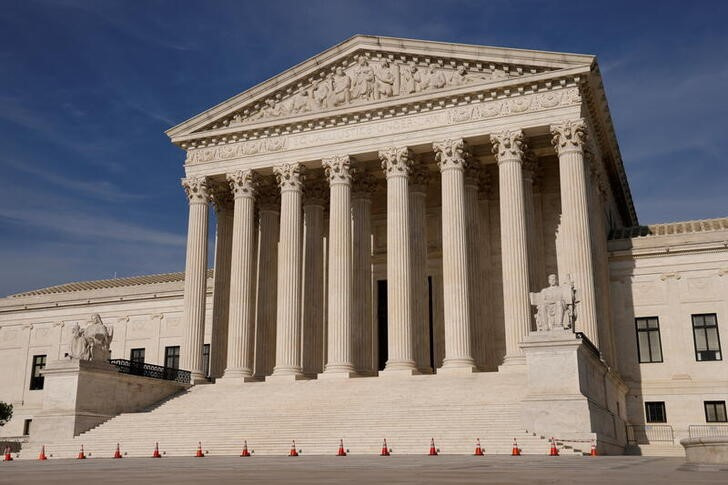By John Kruzel
(Reuters) - An Oklahoma school board is set to consider next week whether to approve the first taxpayer-funded religious charter school in the United States in a move that follows recent U.S. Supreme Court rulings expanding religious rights.
Supporters and critics of the proposed St. Isidore of Seville Catholic Virtual School have said the board's vote scheduled for next Tuesday could trigger a significant legal fight over the separation of church and state.
The board is a state entity that considers applications for charter schools - publicly funded but independently run - that operate virtually in Oklahoma.
Any future court battle over St. Isidore could test the scope of the U.S. Constitution's First Amendment "establishment clause," which restricts government officials from endorsing any particular religion, or promoting religion over nonreligion.
St. Isidore, a joint effort by the Catholic Archdiocese of Oklahoma City and Diocese of Tulsa, would offer virtual learning from kindergarten through high school, enrolling up to 500 students in 2024 and eventually expanding to 1,500 students, organizers said. They estimated that it would cost Oklahoma taxpayers up to $25.7 million over its first five years in operation as a charter school.
Brett Farley, executive director of the Catholic Conference of Oklahoma, welcomed the chance for this to become a legal test case. His organization represents the Catholic church on public policy issues.
"That's kind of been our expectation and, frankly, our hope," Farley said, adding that a Supreme Court ruling last June in a case from Maine may have cleared the way for St. Isidore to receive taxpayer funding. "In a lot of minds, this is being seen as the next logical step."
Public funding of religious charter schools has serious implications for taxpayers, nonreligious Americans, followers of other religions and LGBT people, according to Karen Heineman of the Freedom From Religion Foundation, a secular group opposing the school's application.
"Any minority group out there that is not well represented by Catholic doctrine should be concerned," Heineman said.
The Supreme Court's conservative justices have widened religious rights in a series of rulings in recent years including cases involving schools in Maine and Montana.
In the Maine ruling, the court backed two Christian families in their challenge to that state's tuition-assistance program that had excluded private religious schools. Maine had required eligible schools to be "nonsectarian," excluding those promoting a particular religion and presenting material "through the lens of that faith." The justices found that Maine was required to pay for students to attend religious schools if it did so for private secular schools.
In 2020, the Supreme Court endorsed Montana tax credits that helped pay for students to attend religious schools. The court ruled in a Missouri case in 2017 that churches and other religious entities cannot be flatly denied public money even in states whose constitutions explicitly ban such funding.
'THE TRUTH OF THE MATTER'
If approved, St. Isidore would be the first religious charter school in the United States, according to Nicole Garnett, a professor at Notre Dame Law School, which has provided assistance to the school's organizers.
Although some existing U.S. charter schools are affiliated with religious institutions, their curriculum is secular, added Garnett, a former law clerk for conservative Supreme Court Justice Clarence Thomas.
"It would teach religion as the truth of the matter," Garnett said of St. Isidore.
Charter schools in Oklahoma are considered public schools and draw funding from the government. In the 2020-21 school year, the state's 31 charter schools received $420 million to support about 80,000 students, or roughly 12% of Oklahoma's public school pupils.
St. Isidore chose not to set up as a private school because tuition costs would have been prohibitive for the rural families it seeks to serve, its organizers said.
Its pursuit of approval as a charter school has divided top officials in the Republican-governed state.
The state's then-Attorney General John O'Connor, a Republican, in December wrote that the Supreme Court rulings in the Maine, Montana and Missouri cases would effectively permit the religiously based charter school - an opinion applauded by Oklahoma's Republican Governor Kevin Stitt.
O'Connor's successor as attorney general, Republican Gentner Drummond, withdrew that opinion in February, saying it "misuses the concept of religious liberty by employing it as a means to justify state-funded religion."
Secular opponents have said religious charter schools would violate legal limits on government involvement in religion.

Under what is known as the "ministerial exception," religious employers are shielded from certain workplace bias lawsuits even in instances that might otherwise violate anti-discrimination laws. St. Isidore's organizers have said that exception would apply to every teacher and administrator at the proposed school.
Michael Scaperlanda, a member of the school's governing body, said employees who are "publicly living a life inconsistent" with Catholic teachings could be fired.